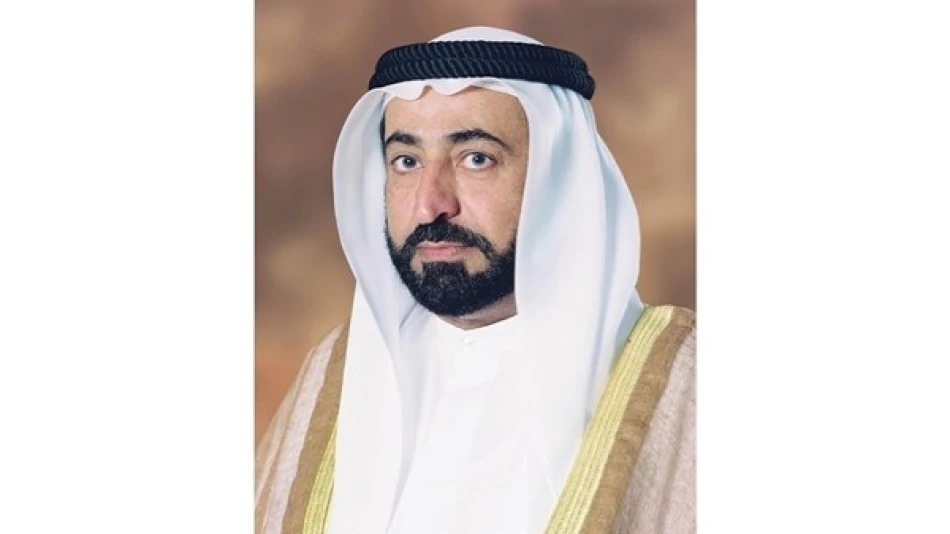
The Ruler of Sharjah Issues Decree to Establish and Organize the Sharjah Council for Family and Community
Sharjah Consolidates Social Development Under New Unified Council
The Emirate of Sharjah has established a comprehensive Family and Community Council that consolidates multiple social development institutions under one strategic umbrella, signaling a shift toward more integrated governance of family welfare, women's empowerment, and youth development. The move positions Sharjah as a regional leader in holistic community development while creating potential synergies across previously fragmented social programs.
Strategic Restructuring of Social Institutions
His Highness Dr. Sheikh Sultan bin Mohammed Al Qasimi, Ruler of Sharjah, issued an Emiri decree establishing the Sharjah Family and Community Council, with Sheikha Jawaher bint Mohammed Al Qasimi appointed as its chairperson. The council replaces the existing Supreme Council for Family Affairs and inherits all its assets, rights, and obligations.
The new entity brings together eleven major institutions under one administrative structure, including the Sharjah Family Development Foundation, Nama Women Advancement Establishment, Sharjah Women's Sports Foundation, and the Big Heart Foundation. This consolidation mirrors similar institutional streamlining efforts seen in Singapore's social development sector and reflects a growing trend toward integrated governance models in the Gulf region.
Comprehensive Mandate Spanning Multiple Sectors
The council's scope extends beyond traditional family services to encompass cultural preservation, hospitality services, media operations, and sports development. This broad mandate suggests Sharjah's recognition that family welfare intersects with economic opportunity, cultural identity, and community engagement—a more sophisticated approach than the siloed social programs common in many developing regions.
Key objectives include developing strategic policies for family affairs, women's issues, youth development, and cultural preservation, while coordinating efforts between affiliated institutions to ensure integration. The council will also support humanitarian and developmental initiatives locally, regionally, and globally, focusing on child protection and supporting vulnerable families.
Economic Integration Through Hospitality Ventures
A notable aspect of the council's structure is the inclusion of the Sharjah Hospitality Services Group, indicating a hybrid model that combines social services with revenue-generating activities. This approach resembles successful models in countries like Denmark, where social enterprises contribute to funding welfare programs.
Sheikha Jawaher emphasized that hospitality sector investments will serve community interests, with portions of revenue supporting humanitarian initiatives and community development. This self-funding mechanism could provide financial sustainability for social programs while reducing dependence on government budgets—a strategic consideration as Gulf states diversify their economies away from oil dependency.
Regional Context and Competitive Positioning
The establishment comes as UAE emirates increasingly compete to attract talent and investment through enhanced social infrastructure. Dubai's happiness initiatives and Abu Dhabi's quality of life programs have set regional benchmarks, while Sharjah's integrated approach focuses specifically on family-centered development.
This positioning could appeal to expatriate families and investors seeking stable, family-friendly environments. The council's emphasis on preserving national identity while promoting women's economic participation also aligns with broader UAE federal strategies for social cohesion and economic diversification.
Implementation Challenges and Opportunities
The success of this consolidation will largely depend on effective coordination between previously independent institutions. Historical precedents suggest that institutional mergers in the public sector often face initial coordination challenges, but can yield significant efficiency gains when properly managed.
The council's flexibility to add, merge, or eliminate affiliated entities provides adaptive capacity for changing social needs. This structural agility positions Sharjah to respond quickly to demographic shifts, economic changes, or emerging social challenges.
Long-term Vision and Sustainability
Sheikha Jawaher's emphasis on youth as "tomorrow's hope" reflects awareness that current investments in human development will determine Sharjah's competitiveness in coming decades. The integrated approach to family welfare, education, and economic empowerment creates a pipeline from early childhood development through adult economic participation.
The council's four-decade evolution from a single girls' park to a comprehensive social development ecosystem demonstrates sustained commitment to human capital development. This long-term perspective, combined with institutional flexibility and revenue diversification, suggests a model that other regional governments may study and potentially replicate.
For investors and businesses, the council's establishment signals government commitment to social stability and human capital development—factors increasingly important for sustainable economic growth in knowledge-based economies.
Most Viewed News

 Layla Al Mansoori
Layla Al Mansoori






